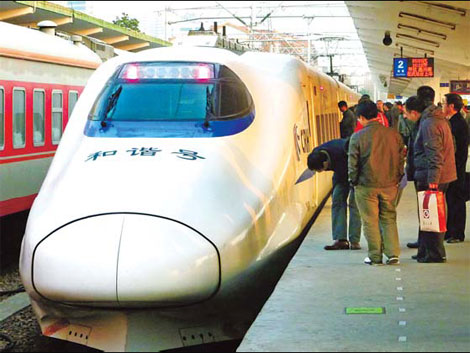Railway leads the way
HANGZHOU - Zhejiang province is accelerating the construction of a high-speed railway and highway network to help boost the logistics industry, which is expected to lead the next round of local economic growth.
By 2012, the length of high-speed railway per capita in the province is set to rank first in China, said Zhang Yang, vice-director of the Shanghai Railway Bureau.
"Zhejiang has a lot of advantages for the marine and modern logistics service sectors. But a less developed railway infrastructure has restricted these sectors from playing a more important role in the local economy," said Li Zhihai, director of the Zhejiang Development and Reform Commission.
Li said an advanced transportation network would buoy logistics services to help it become a key growth area in the region.
The province already has a deep-water coastline of more than 500 kilometers, accounting for one-third of China's total coastline.
The development of the Shanghai International Shipping Center provides top regional advantages to Zhejiang, Li said, adding that the Zhoushan - Ningbo Port in Zhejiang, the biggest port in China by throughput, also offers good opportunities to develop the logistics sector.
Cargo throughput of the port reached 715 million tons, an increase of 10.9 percent in 2008. In the first quarter this year, total throughput increased by 34.4 percent year-on-year. It is set to become an important hub of dry bulk cargo and a trade platform for commodities in the near future.
In the past five years, the length of high-speed railways in Zhejiang has increased 351 kilometers. In 2009, spurred by an investment of 33 billion yuan, railways of more than 1,600 kilometers started operations, with high-speed railways comprising 1,000 kilometers.
In 2010, five high-speed railways connecting Nanjing and Hangzhou, Hangzhou and Ningbo, Shanghai and Hangzhou, Hangzhou and Changsha, and Jinhua and Wenzhou commenced construction. The construction of railways to Jiangxi, Anhui and other provinces are also scheduled to begin within the year, supported by a 48 billion yuan investment.
The total length of highways in Zhejiang has reached 3,300 kilometers and the main framework of the provincial highway network has been created. More than 576 kilometers of highway will also be constructed this year and the total length is expected to reach 5,000 kilometers by 2020, said Li.
Zhejiang authorities expect a one-hour transportation circle between Hangzhou, Shanghai and Nanjing, a two-hour intercity network from Hangzhou to other cities within Zhejiang, and 10 railways connecting other provinces to be in place in the next five years.
CHINA DAILY
|
Passengers wait to board a high-speed train at Ningbo railway station. Zhang Heping / For China Daily |
(China Daily 05/01/2010 page9)









